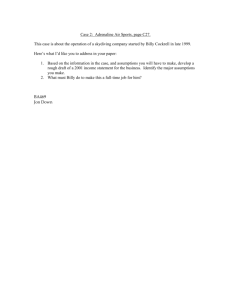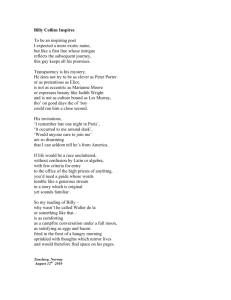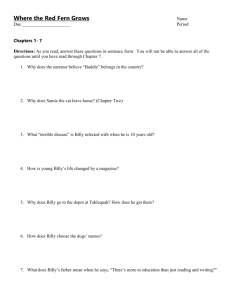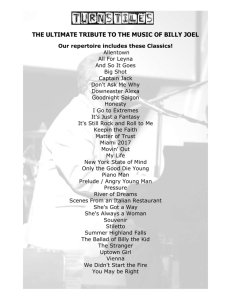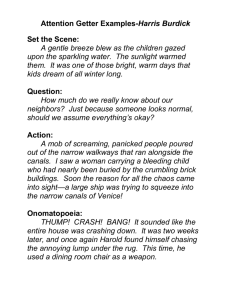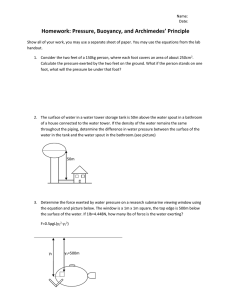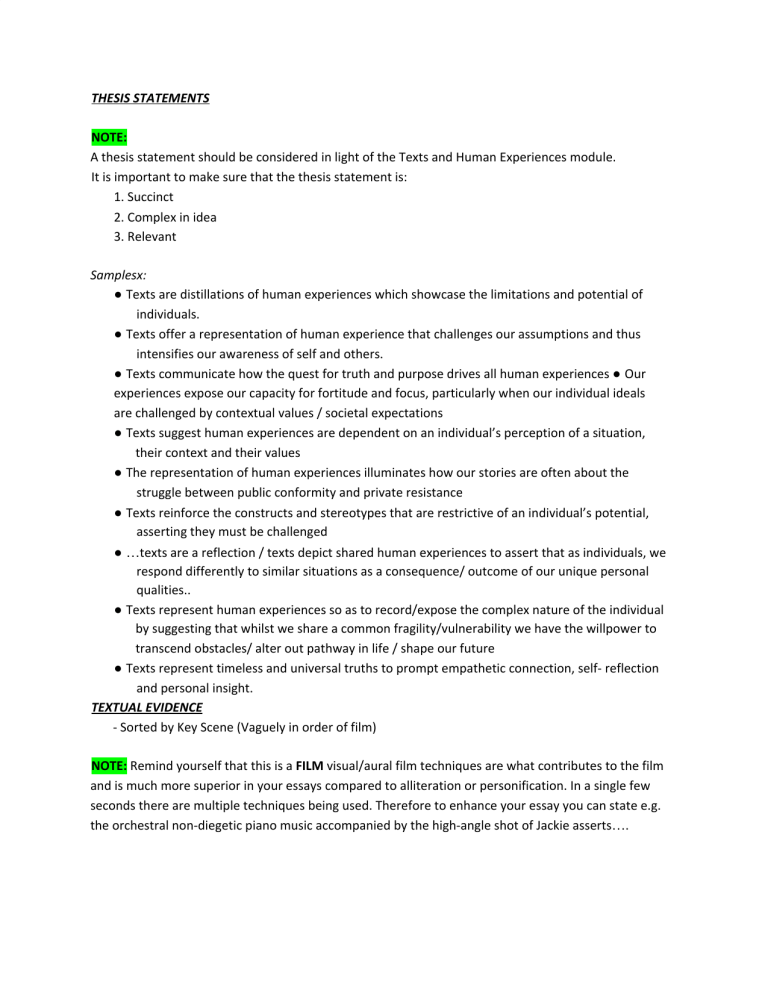
THESIS STATEMENTS NOTE: A thesis statement should be considered in light of the Texts and Human Experiences module. It is important to make sure that the thesis statement is: 1. Succinct 2. Complex in idea 3. Relevant Samplesx: ● Texts are distillations of human experiences which showcase the limitations and potential of individuals. ● Texts offer a representation of human experience that challenges our assumptions and thus intensifies our awareness of self and others. ● Texts communicate how the quest for truth and purpose drives all human experiences ● Our experiences expose our capacity for fortitude and focus, particularly when our individual ideals are challenged by contextual values / societal expectations ● Texts suggest human experiences are dependent on an individual’s perception of a situation, their context and their values ● The representation of human experiences illuminates how our stories are often about the struggle between public conformity and private resistance ● Texts reinforce the constructs and stereotypes that are restrictive of an individual’s potential, asserting they must be challenged ● …texts are a reflection / texts depict shared human experiences to assert that as individuals, we respond differently to similar situations as a consequence/ outcome of our unique personal qualities.. ● Texts represent human experiences so as to record/expose the complex nature of the individual by suggesting that whilst we share a common fragility/vulnerability we have the willpower to transcend obstacles/ alter out pathway in life / shape our future ● Texts represent timeless and universal truths to prompt empathetic connection, self- reflection and personal insight. TEXTUAL EVIDENCE - Sorted by Key Scene (Vaguely in order of film) NOTE: Remind yourself that this is a FILM visual/aural film techniques are what contributes to the film and is much more superior in your essays compared to alliteration or personification. In a single few seconds there are multiple techniques being used. Therefore to enhance your essay you can state e.g. the orchestral non-diegetic piano music accompanied by the high-angle shot of Jackie asserts…. 1. Christmas opening scene and smashing of piano Close Up Shot of sledgehammer smashing piano followed by panning shot Reveals Billy sitting on a step in the toilet doorway. Billy winces, jolts every time the hammer lands on the piano evoking his discomfort. He appears in physical pain as he is horrified by his father’s choice to destroy a sacred symbol representing his connection to his mother and his creativity. Juxtaposition ‘Do you think she’ll mind?’ “Shut it Billy, she’s dead”= For Billy, his mother is still very present, for Jackie, he cannot cope with her absence. He admonishes Billy who is clearly affected by Jackie’s aggression. Diegetic sounds of Jackie sobbing Reveals his distress over what has been lost, the struggles endured and the pressures to provide while maintaining his dignity Long shot of Tony framed in the mirror’s reflection To symbolise his disconnection from the family. 2. Boys don’t do Ballet Cutting shots between Billy and Jackie (Low angle shot) Emphasising Tony’s status and strength over Billy. “You won’t fool the children of the revolution” Reveals the way in which Billy is evolving, as he is not fooled by the expectations of gender that have been imposed on him by his father (and community). 3. Billy and Michael Two Shot of Billy and Michael Reveals their perspectives as Michael confirms his identity / homosexuality with a kiss and an attempt to warm Billy’s hands. The two shot emphasises Billy’s acceptance of Michael for who he is which is reinforced by the close-up shot of his smiling face and the gifting of the tutu, gestures that symbolise Billy’s recognition of Michael’s obstacles as he has also experienced them. Both challenge gender expectations imposed on them by their working class context 4. Billy/Ms Winlkinson’s secret Lessons - Billy reading out his mother’s letter Low-key lighting when Billy enters the gym and while he reads the letter Initially the low key lighting evokes feelings of loss and grief as Billy introduces the letter and Ms Wilkinson reads it out loud further alluding to his trust of Mrs W and his true motive to pursue his dreams Symbolism of the mother’s letter ● Letter symbolises the strength that Billy draws from tangible goods and memories as it offers resilience and prompts Billy to have confidence in his own identity ● Alludes to the human experience of grief and loss and the way in which the experience does not have to debilitate individuals and that contrastingly we can find reassurance and be enlivened as tragedy can offer a pathway to growth 5. Scab Scene - Jackie crossing the Picket line High angle shot of Jackie crossing the picket line Contextualises Jackie walking through the coal pit with his hands in his pockets suggesting the burden of his decision to sacrifice his pride and core values of loyalty to cross the picket line. Long shot of Jackie in the minefields Emphasises how small he is in the face of these political issues. He makes a challenging personal decision to surrender his unionist values of solidarity and loyalty demonstrating his awareness of Billy’s identity and potential future. He chooses to accept scorn, hatred, and isolation over camaraderie, which serves as evidence of the enormity of his sacrifice. Two shot of Jackie and Tony falling onto their knees Highlights their complete defeat in the face of these family and community issues. In the background we can see men from both sides of the picket line, while father and son kneel in the middle. Tony hugs Jackie offering emotional and physical support. It is a cathartic exchange that addresses and mends the strained relationship. 6. The Bridge where Mrs Wilkinson tells the story of Swan Lake Intertextuality of Swan Lake and music by Tchaikovsky Symbolises Billy’s state of entrapment as he was made to be something he wasn’t. The story itself represents the idea of an individual being subject to stronger forces while also foreshadowing Billy striving to overcome them 7. Billy auditioning for the Royal Ballet School Gentle non-diegetic music rises as he speaks The same music that is plated on the piano during the opening of the scene and the music played when he reads the letter from his mum. Due to the music the mood shifts from tense to hopeful. “I’m just there, flying, like a bird” simile Contributes to the Swan Lake motif allowing him to reiterate the way in which dance provides him with the freedom to transcend obstacles 8. Final Scene From Swan Lake Camera cuts between close ups of Billy and his family + Michael Alludes to how after achieving self-actualisation and overcoming obstacles he is able to showcase his extraordinary talent and passion for dance that his Durham community was initially so hesitant to acknowledge. Medium shots of other dancers glancing at Billy before they go on stage Emphasising his status as a primary dancer. The subversion of the classic Swan Lake ending with Billy performing a female’s role emphasises the degree of his success. Tchaikovsky’s Swan Lake music is used intertextually and freeze frame of Billy in the air During the leap the freeze frame suggests that Billy has fulfilled his potential, confirmed his identity as a dancer and found capacity for self-expression through an artistic medium.
